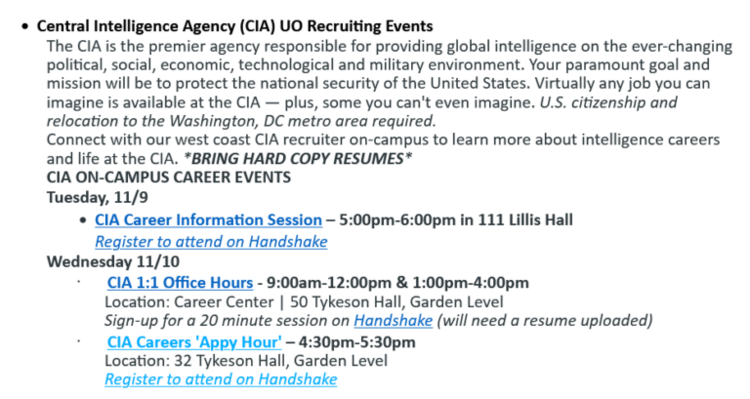CIA, Go Away!
J. Ellis #cia #cops off campus #labor

In the first couple weeks of November, undergraduate and graduate students across all departments received their weekly advising emails. Those of us who actually read these newsletter updates couldn’t help but notice a curious opportunity announced in fine print:

Virtually any job you can imagine is available at the CIA – plus, some you can't even imagine
This raised some questions: Who arranged for the CIA to recruit on campus, and why? Most importantly, what can we do to stop it from happening?During a time of resurgence for campus organizing, with groups such as Cops off Campus calling for the abolition of campus police presence, nothing feels like more of a challenge to these causes than an open invitation for the world’s cops to come poach young talent at the University of Oregon.
Luckily the GTFF -the university’s backbone- mobilized a countermovement to denounce the CIA’s sneaky recruitment tactics and criminal legacy.
Members of GTFF called for a teach-in on the afternoon of November 10 in the courtyard outside of Tykeson Hall, where just inside CIA recruiters were stationed with the task of marketing global terrorism campaigns as a career advancement opportunity.
The recruitment announcement itself came abruptly, the countermovement against it even more so. Despite the quick turnaround, the teach-in drew about 30 individuals to attend and engage in discourse about the military industrial complex on college campuses. The teach-in was both an open forum and an opportunity for speakers to build awareness about how the CIA functions to enforce imperial hegemony— there were five speakers total that spanned disciplines from chemistry to philosophy. Each addressed different ways the CIA has caused harm globally, and a UO graduate educator kicked off the round of speeches by mentioning the most radicalizing Wikipedia list known to man (you know the one)
After this speaker laid the groundwork as to why oppose the CIA in the first place, the second expanded upon this by describing the agency as a “United States sponsored instrument of death,” and called to put an end to campus recruitment and overall abolition of the CIA. Every speaker to follow echoed this sentiment, emphasizing how the CIA solely exists to uphold the dynamics of racial capitalism by infiltrating institutions such as governments, universities, and medicine. Speakers traced the history of the CIA, its legacy, and its interventions in global liberation struggles.
Like the police, the CIA was born out of a unique sociopolitical context in history that is no longer relevant to modern conditions. The CIA was established in 1947 at the dawn of the Cold War to monitor Soviet counterintelligence, intended for termination at the end of the war.
So why has the CIA maintained relevance all these years later?
The answer should be obvious by now: the United States government made it profitable.
In President Eisenhower’s 1961 farewell address, he famously cautioned against a term he dubbed the “military industrial complex,” (MIC) a phenomena that has since sedimented itself within modern political economies. The military industrial complex made war a business, instead of a social burden.
The rest of the speakers explained how these dynamics function in a recruitment setting, discussing the “militainment” industry (i.e. Marvel, Jason Bourne, Top Gun, Black Ops…) and other enticement strategies. Much of the CIA’s continued relevance depends on flashy optics such as these.
From its inception, the CIA engaged in propaganda and clandestine operations to mold public perception and maintain political approval.
Mind you, this isn’t just heresy coming from a bunch of tinfoil-hat-wearing conspiracy theorists: the operations conducted by the CIA that were mentioned are all public record, documented through testimonies from former Presidents, CIA Directors, whistleblowers, and academic works such as the Stanford Law School’s 2012 study “Life Under Drones: Death, Injury, and Trauma to Civilians from US Drone Practices in Pakistan.” Pakistan being the same country where the agency also staged a fake polio vaccine drive in 2011.
In the open forum following the speeches, participants had the opportunity to share their knowledge and lament imperialism.
One attendee, Jane Cramer, spoke on the CIA’s long history of undermining justice movements around the world, allowing the United States to control any given foreign state’s politics and resources. Cramer teaches a political science course at the UO called “US Interventions in Developing Nations,” where students study the many US military/CIA interventions of the last century. Not only does Cramer consider the agency’s atrocities committed abroad, she is also an astute watchdog locally; observing the subtle ways the CIA operates to placate civilians, appeal to both public and private interests, and cash in on the military industrial complex.
Cramer explained the various tactics (both at the event and later in a follow-up interview) that the CIA uses to entice UO’s sitting ducks to apply. It is crucial to understand that much of the CIA’s work is carried out in the reportedly mundane analysis sector, a field of work that the agency tries to sell as routine bureaucratic pencil-pushing— the perfect entry-level job.
Meanwhile, these operations are more explicitly sinister, agents in this line of work are responsible for carrying out strategies developed by the CIA, such as Operation Ajax. The CIA renders evil banal via bureaucratic detachment and flattering optics, minimizing the moral implications of their mission by characterizing a day at work like any other desk job: paperwork and aimless tasks. To prospective employees, this proves effective enough for recruitment; the general information meeting for recruitment on November 9th reportedly had 60 in attendance. The countermovement was roughly half that size. The agency’s warm reception on campus is just another example of the marriage between military and educational industrial complexes. In fact, when Eisenhower first coined the term MIC, he referred to academics as one of the forces that fuels the system. Look into any reputable university in this country, and in all likelihood you’ll find they have close working relationships with instruments of violence.
After all, much of defense technology relies on innovation, a seemingly endless resource on university campuses. This phenomenon is occurring nationally. It is commonplace for university advising departments to funnel its brightest students into the war machine; whether working for the CIA, the FBI, the US Military, or defense contractors. Their deceptively simple recruitment strategies attract vulnerable students seeking job security, and manipulate this need by trapping young professionals in contracts that copyright and patent their organic intellectual property, which strips them of their creative autonomy/agency before their lives have even begun.
This entrapment is especially apparent at schools with robust STEM programs, such as MIT or Arizona State (ASU). An engineering student at ASU anonymously tipped the Insurgent onto the extent of power defense contractors possess in the school’s research and development projects. At ASU, engineering students have to complete a capstone research curriculum in order to earn their degrees. In doing so, many initiate internships with companies that partner with this program. It just so happens that most of the partner companies are some of the largest defense contractors in the world: Raytheon (one project), Honeywell Aerospace (twelve projects—some aerospace, some defense), Northrop Grumman (one project), and the US Air Force (one project).
According to the whistleblower, some project requirements mandate that students sign NDAs before they even really know what they are signing up for. Not only do their ideas become the property of corporations, but they may also think they are signing on to design the latest spacecraft and end up producing warheads. You may have to be a rocket scientist to qualify for a spot at Raytheon, but you certainly don’t have to be one to see the ethical dilemma these programs pose.
The crowd that gathered outside Tykeson Hall that Wednesday took essential first steps in a much larger resistance against the union of the education and military industrial complexes at the University of Oregon. Saying no to the CIA is saying no to predatory recruitment, no to cops, no to war, and no to imperialism. Our defiance, while small in scale to what we’re up against, embodies a broader decolonial and egalitarian project that works to dismantle racial capitalism and the systems that uphold it.
The University’s continued invitation to military recruiters is veiled violence. If the school really means anything by its land acknowledgements or “statements condemning racism,” then structures of state and police violence would no longer be welcome on campus.